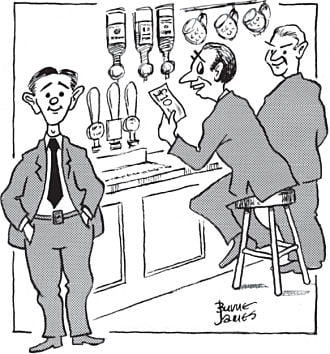In the initiation ceremony Masons hear the phrase:
… a poor candidate… … who has been well and worthily recommended, regularly proposed and approved in open Lodge, and now comes of his own free will and accord, properly prepared, humbly soliciting to be admitted to the mysteries and privileges of Freemasonry”
Freemasons use the word “free” in several ways – Free Mason or Freemason; freeborn, free and accepted; free will and accord. So familiar are these words, and so frequently used, that few questions are ever asked about them.
“Own free will and accord” is a phrase that every Freemason knows. It is one of a number of expressions used in ritual that is to all intent and purposes universal throughout the English-speaking Masonic world. When this phrase is thoughtfully considered, the immediate questions arise:
—Why is “free will” alone not enough?
—Why “accord” alone is not enough?
—Why does Freemasonry use “free will and accord” as the necessary phrase by which an Initiate describes his motive in asking to become a member?
Reference to a dictionary in use at the time the ritual was settled in its present form describes “accord” as “to adjust, unite, to agree with; a compact; harmony; a union”. The word “free will” meant “unconstrained, without care”. Neither of these explanations is helpful in an attempt to explain the modern understanding of the origins and the intentions of the expression.
Modern Masonic usage has put much more into the words than the early dictionary explains, or may be intended. That which is done “of my own accord” is accomplished with desire. Many acts may be those of free will, which are accomplished without desire, even sometimes with distaste. Thus, faced with the choice of two evils, man chooses the lesser by his exercise of free will.
What he does of his own accord is not influenced by a prospective penalty, but by a want or desire that includes a hope of some better state, some happiness – some good to come from such action.
Dr. Joseph Fort Newton, Baptist minister and Masonic historian, defined the difference most happily, in answering the question “Why both free will and accord?”
He said: Free will denotes liberty of choice, self determination; lack of restraint, while ‘accord’ implies wholeheartedness, free from inducement or pressure of any kind.
Now, this is where the problem begins. Let us return to study the phraseology as it was originally contained in the ritual, as it was settled in its present form. Although the matter was raised as early as 1723 by Anderson, it was shortly after the union of the two Grand Lodges that, in 1815, the new Book of Constitutions proclaimed to the world forever the non-sectarian character of Freemasonry in the Charge “Concerning God and Religion”.
It provided for Freemasons, wherever dispersed, to choose of their own free will and accord their own religion. At the entrance into the Lodge, the Master asks the candidate: “Are you a free man and of the full age of 21 years?” In other words: are you a responsible adult fit to make sound judgment about becoming a Freemason or not? Those who desire to partake of the mysteries and privileges of our Order must seek them of their own free will and accord.
In some Constitutions, the candidate’s plea for entrance into a Masonic Lodge is first explained by a quotation from the Great Light:
Ask, and it shall be given you; seek, and ye shall find; knock, and it shall be opened unto you. For every one that asketh receiveth; and he that seeketh findeth; and to him that knocketh it shall be opened. (Matthew 7: 7-8)
Following the candidate’s entrance into the Lodge, the Master says:
Do you seriously declare on your honour, that, unbiased by the improper solicitation of friends against your own inclination, and uninfluenced by mercenary or other unworthy motive, you freely and voluntarily offer yourself a candidate of the mysteries and privileges of Freemasonry?
Such language implies that there is such a thing as “proper solicitation of friends”.
It is natural to enquire what may be the distinction between solicitation which is ‘improper’ and that which is ‘proper’. Masonic authorities have in the past, and still do have, differences of opinion on this matter. It all seems to depend upon the definition of the word “solicitation”. But here we have a problem, since the meaning of the word has changed since the ritual was settled in its present form.
Samuel Johnson’s 1754 dictionary, published at the time, defines the word: “solicitation – importunity, an entreaty.” The word ‘importunity’ was defined as “to tease with incessant solicitation.” The word ‘entreaty’ meant “to beg earnestly.”
The modern Chamber’s Dictionary uses less provocative language: “solicitation: an earnest request; an invitation.” One can therefore conclude the “improper solicitation” implies “ with unreasonable force or persuasion.” If the original definition from 1754 is accepted, then some authorities will argue that there can be no such thing as ‘proper solicitation’. If that is the case, then the wording in the initiation ceremony that introduces the candidate as someone who “now comes of his own free will and accord humbly soliciting to be admitted to the mysteries and privileges of Freemasonry” does not make sense.
We can reasonably conclude that there is such a thing as ‘proper solicitation’, something, for example, that might transpire between father and son. We can – and should – make responsible representations to explain to individuals who, by their membership, would substantially enhance and enrich the Brotherhood. May this approach make a favourable impact on Masons, and may the technique of proper solicitation be passed on from generation to generation.
Ray Hollins is the author of A Daily Advancement in Masonic Knowledge: 100 Short Talks on the Craft.
For further information contact The Freemason Ltd at www.masonicshortalks.com
